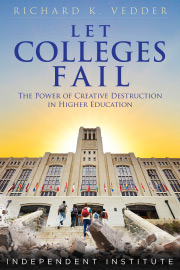Columnist Chris Sheridan was on target calling for reduced barriers to entry into the teaching profession ("Widen search for good teachers," Forum, Feb. 18). While she did mention Cleveland’s failure to receiving waivers from the Ohio Department of Education form some teaching regulations, she did not emphasize the extent to which Ohio has made it more difficult to teach.
New, proposed certification standards require new teachers to acquire a master’s degree within a few years if they wish permanent certification. New provisions provide for special supervision of first-year teachers. A new category of certification was added a few years ago for middle-school teachers, reducing the ease of moving from elementary or high schools to teaching the middle grades.
Yet, there is little or no education justification for these new requirements. For example, Joshua Hall of the Buckeye Institute and I have run hundreds of statistical examination of academic performance in Ohio schools. In the vast majority of these studies, there is no statistically significant t relationship between the percent of teachers holding master’s degrees (or more) and average student academic performance. The master’s requirement makes no sense. Our research findings are hardly unique.
Why, then, all the new requirements, particularly when states like New Jersey have found that reducing barriers to becoming teachers has worked well? While there is no academic justification for increasing requirements, there are financial windfalls for special interests. Increased teaching barriers help maintain teacher shortages and increase pressures to raise salaries for existing teachers. Yet, the main supporters of the new proposed standards are not the teacher unions (who reportedly even oppose some of the new provisions), but rather the colleges of education, who derive tuition income and state subsidies from students taking their courses.
One of the dirty little secrets of higher education is that colleges of education are considered by most faculty as mindless, anti-intellectual wastelands. Standards are often low. At Ohio University, for example, the average grade point of undergraduates in education courses is 3.80 – far above any other college in the university. In the fall quarter, I personally gave more "D" and "F" grades than the entire College of Education has given in the past two years. A majority of grades they give are "A" or "A-".
Experienced people are being kept out of teaching in our public schools. I have taught 36 years, and have high demand for my classes despite my reputation as a tough grader. This year, I will have taught economics to 250 students mostly aged 18 to 22, but am not allowed to permanently teach 17-year-old high school seniors. The proposed new rules do not change this.
In one area, guidance counseling, the new certification standards outwardly appear to liberalize entry, but even these changes are questionable. What does it take to be a good guidance counselor? First, maturity, honesty and good judgment. Second, an ability to communicate well with kids. Third, a love of children. Fourth, a good education, including familiarity with American higher education (since college advising is usually part of the job description). Fifth, a solid understanding of what goes on in public school classrooms, since counselors advise students as to which classes to take.
The fist three attributes above are best ascertained by principals through interviews, college transcripts and letters of recommendation. The fourth and fifth traits are arguments for requiring a bachelor’s degree and some teaching experience. The proposed new standards require a master’s degree, and allow potential counselors to skip teaching completely if they complete a 600-hour internship "in a school setting" – administered by tuition-collecting colleges of education. It would make far more sense to eliminate the master’s requirement while retaining the existing teaching requirement. But this is anathema to the education colleges, which depend on students in their master’s programs to meet their payrolls.
What should new certification standards require? Here are some ideas:
Let anyone with a bachelor’s degree from an accredited university teach. Prohibit future teachers from having more than one-fifth of their undergraduate work in education courses, and require one-half of that to be in real classroom settings.
- Let anyone with a bachelor’s degree from an accredited university teach. Prohibit future teachers from having more than one-fifth of their undergraduate work in education courses, and require one-half of that to be in real classroom settings.
- Turn certification over to school districts; it is the principals and superintendents who have to live with the hires that they make, and the State Department of Education has been hostile to alternative certification.
- Let business and government managers and entrepreneurs become principals and superintendents, requiring, after they begin service, no more than three courses in educational law, finance and curriculum for certification.
Education is too important to leave to educators. Let us open doors to new talent in Ohio schools.













